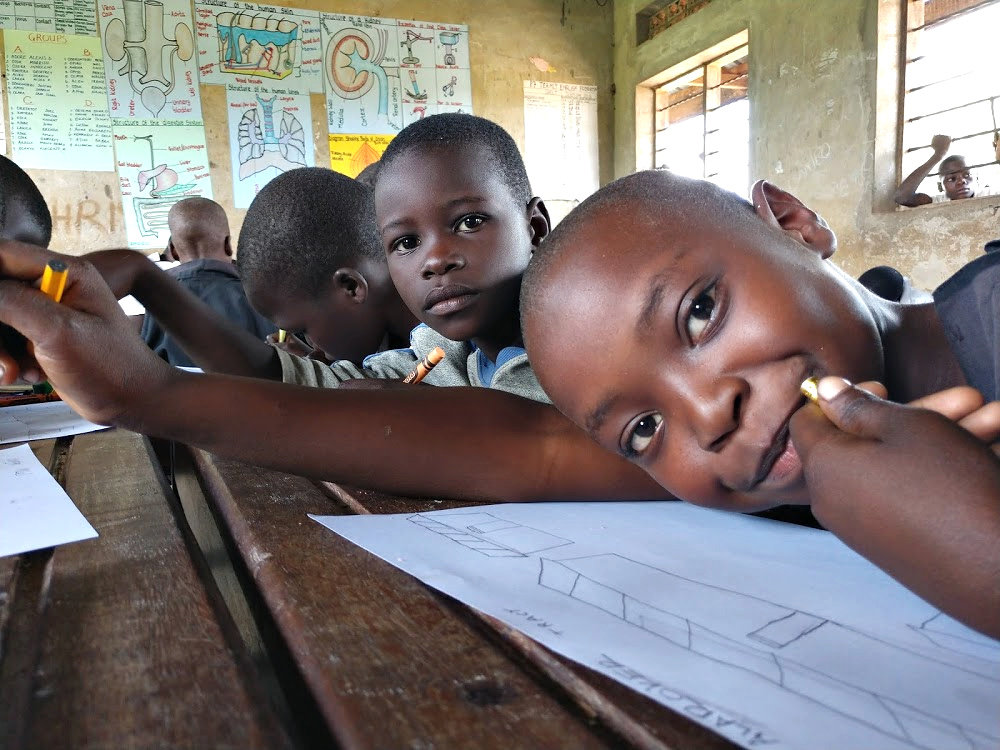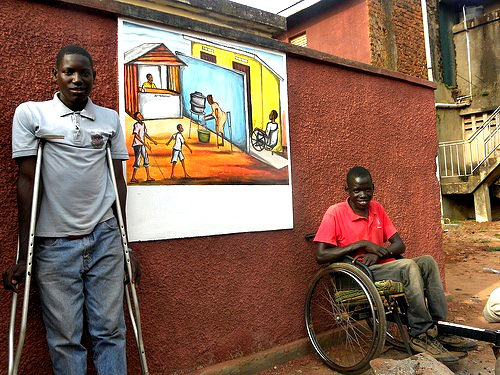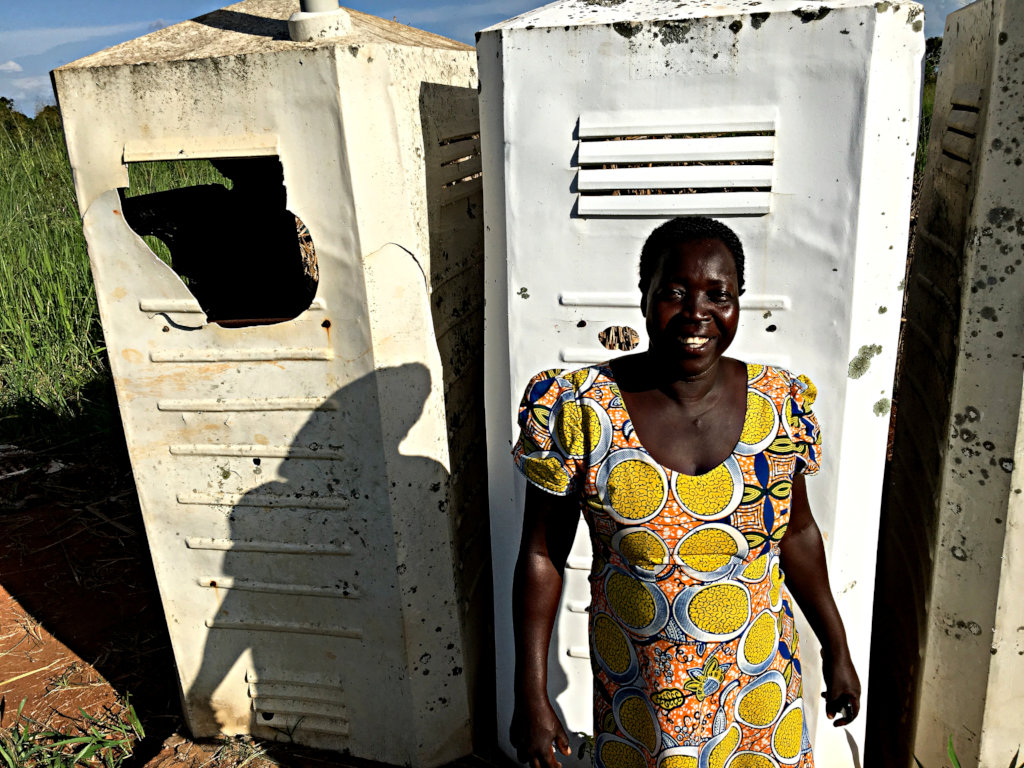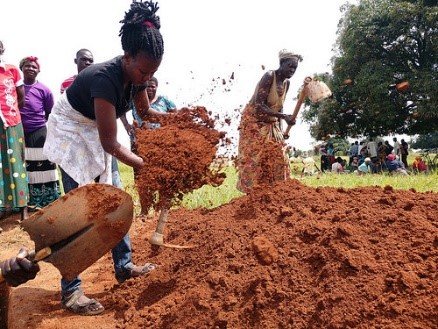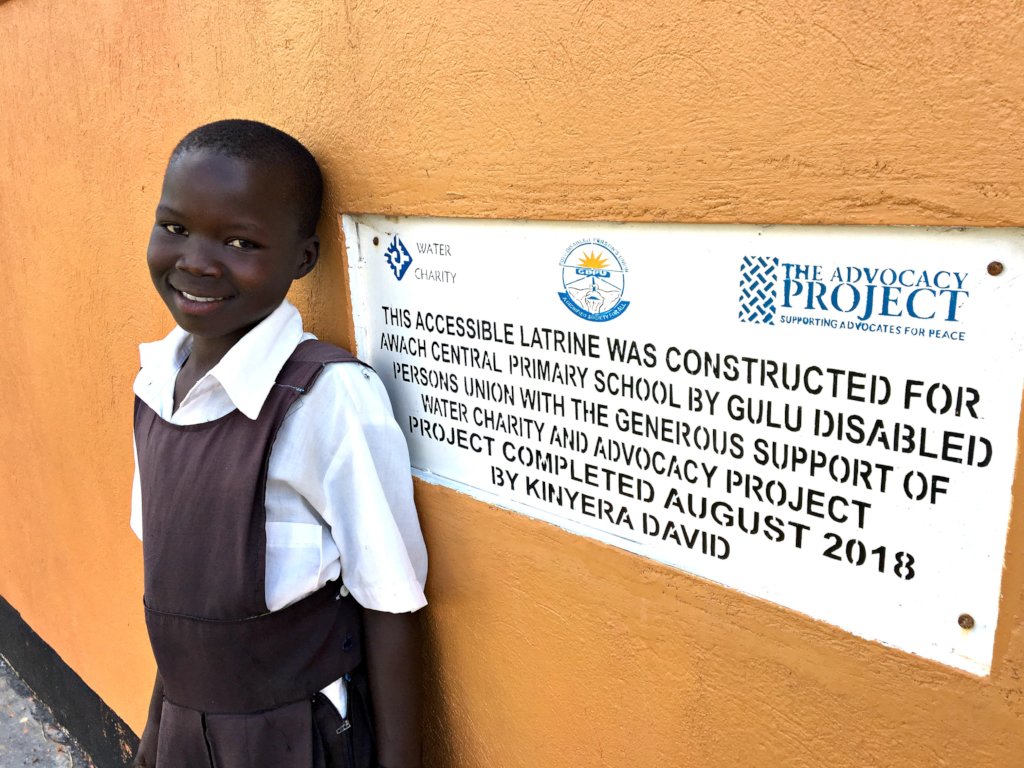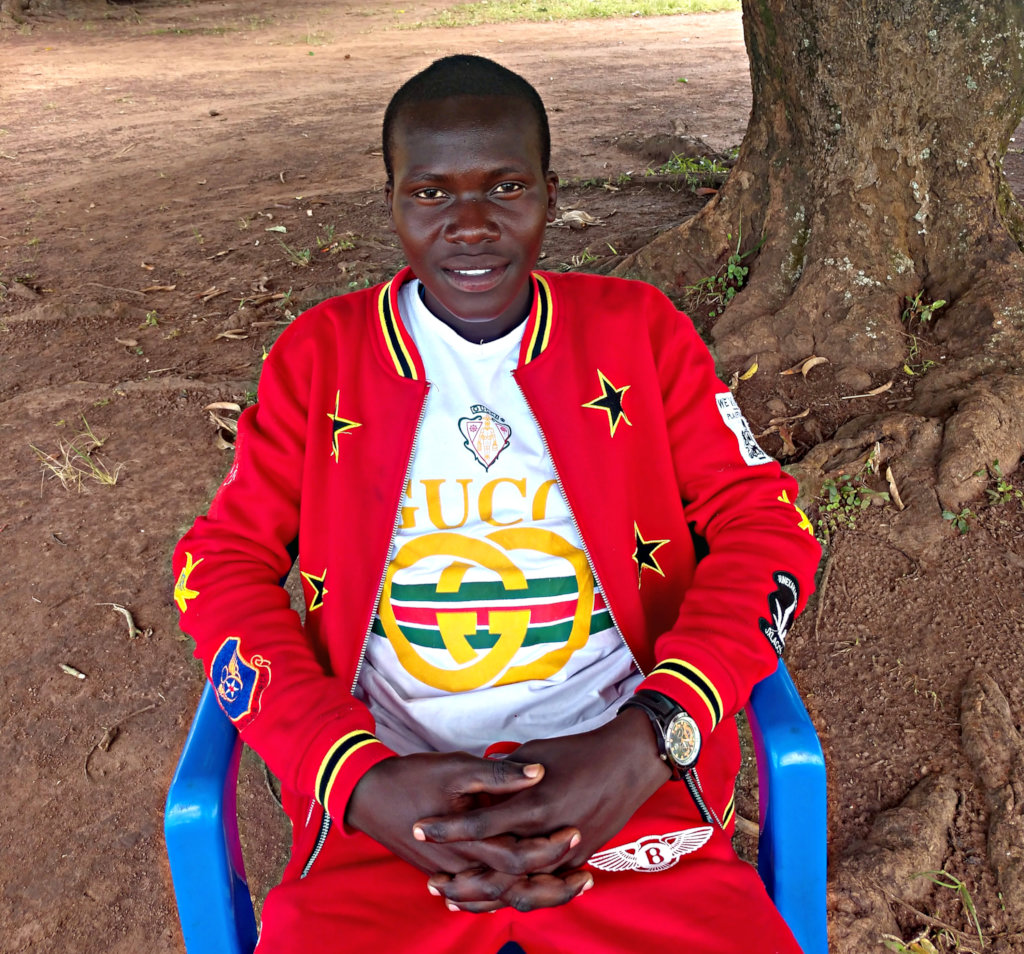By Iain Guest | Project leader
This report is being sent, with gratitude, to everyone who has donated to one of four appeals launched by The Advocacy Project on behalf of students with disability in northern Uganda. As this program enters its fourth year it seems an appropriate time to bring you up to speed and explain how your contribution is helping to define a new approach to education in rural Africa.
This program began with a story. In 2011 Rebecca (University of Maryland) went to Uganda to serve as a Peace Fellow at the Gulu Disabled Persons Union (GDPU), an advocate for disability rights in the district of Gulu. Rebecca found that GDPU hosted the only publicly accessible toilet in the entire district of Gulu and wrote a strong blog inviting us to imagine what this meant for someone with a disability when nature called:
“You don’t have time to head to GDPU and spend nearly an hour of your day on the road. Instead, you opt to use one of the public bathrooms, maybe paying 200/=. Since it is a public pit latrine, it’s likely incredibly filthy from who-knows-what by who-knows-who. Since your disability does not allow use of your legs, you slide to your hands and knees to crawl into the latrine and balance yourself as best as possible before crawling back outside, climbing back on your wheelchair, and returning to work.”
Call to action
Rebecca’s graphic description served as a call to action. With help from our 2012 Fellow Dane and his 2013 successor John we raised around $2,000 which GDPU used to install an accessible toilet at the Gulu bus park. After many delay, the toilet opened in 2014, much to the relief of people with disability who frequented down-town Gulu. The relief was short-lived. Within a year the toilet had been vandalized and closed. With the wisdom of hind-sight it was clear that we had made some classic mistakes. The design (a flush toilet) had been too sophisticated and the location too exposed. No one had taken ownership or paid for the upkeep of the toilet. We had not worked closely enough with the stakeholders or government.
At GDPU’s suggestion, we turned to schools. Our 2014 Fellow Kathryn helped Patrick from GDPU to survey 12 primary schools and found the toilets to be in terrible shape. In August I visited the Tochi School with Patrick and Kathryn. The toilets had been installed by an international NGO with little regard for the special needs of students with disability. Wheelchair ramps were too steep and ended in steps. A tank for handwashing had been vandalized the day after it was installed and never replaced.
This was particularly difficult for the 16 students at Tochi with special needs like Ivan, 14, who had a mild case of polio. He told us that going to the toilet was incredibly difficult. Making matters worse, he was being mercilessly bullied. Some of his classmates had even smeared feces on the toilet grab bars, in an attempt to force him out of school. Christine, the school Principal, said that they were jealous of Ivan’s good grades. Christine seemed close to despair. Ivan was close to dropping out of school.
Getting down to work
At Christine’s request, GDPU and AP agreed to install a new toilet at the Tochi school. The question was – who would pay for it? The answer was provided by our 2015 Peace Fellow Josh, from Columbia University. Josh used Ivan’s poignant story to launch an effective appeal on GoFundMe and raised just over $4,000 from around 45 donors. He helped Patrick to hire a contractor, dig a latrine pit at Tochi, and install a new concrete structure with two accessible toilets - one for girls and one for boys.
Patrick and Josh also introduced training in inclusivity and hygiene for staff and students and purchased soap and new handwashing tanks. Over 1,000 locals attended the opening of the toilet and Christine, the Principal, beamed with pride as her school was praised by local politicians. Also beaming was Ivan, whose classmates wrote and acted in a play that featured Ivan as the hero. His days of being bullied were finished.
Our 2016 Peace Fellow Amy provided us with a reality check. Amy surveyed remote rural schools and recommended that the next toilet should be installed at the Ogul School. But she also reminded us that disability took many forms, including hearing impairment, that needed special instruction rather than accessible toilets. We decided to hold the Ogul project over to 2017, giving us time to reflect and seek more funding.
I visited the Ogul School in June 2017 with Patrick from GDPU and Lauren, our 2017 Peace Fellow. Once again we found toilets in an atrocious condition. After failing to secure funding from the district government, the school Principal Auma had scavenged some portable toilets from a long-abandoned IDP camp which were full of holes and so shaky that they seemed on the point of collapse. Andrew, 8, a quiet-spoken student who had a problem with his knees, told us that he could not squat and that the floor was infested with maggots. Many of his classmates stayed away from school altogether, or returned home to use the fields that were at least familiar. Enrollment at Ogul had fallen from 560 in 2016 to 375 in 2017.
We worked with Lauren to launch a second appeal on GlobalGiving, which raised $2,451 from 26 generous donors. We also secured a grant through the online marketplace Givology. Patrick and Lauren used the money to install four new toilets at Ogul. They were helped by scores of parents who dug the latrine pit. From now on the local community would have a stake in the school. Parents would have an incentive to protect the toilet from vandalism and make sure their children attended school.
By 2018, with two schools refurbished, GDPU felt able to tackle a larger and more remote school at Awach with 911 students. Our 2018 Peace Fellow Chris launched another micro-project on GlobalGiving and raised a cool $4,550. Chris also secured a generous grant from Water Charity. He and Patrick then set out for Awach where they oversaw the draining of the old latrine pit (not a pleasant task!), dug a new pit, renovated 9 toilets, and put in 4 new toilets. Over 80 parents came out to help, including Aderyo, an 84 year-old grandmother. They excavated 1,440 cubic meters of soil in one day – an impressive feat.
Looking to the future
This is where it stands as we head into 2019. What has this program achieved so far?
First, it has developed a model for WASH in schools, with consistent technical specifications, that builds toilets at half the cost of government toilets. Second, it has turned GDPU into an acknowledged expert on WASH and an effective monitor. Third, it has attracted the support of over 100 donors like yourself who have given $23,211.
As a result of your generosity, 1,921 young Ugandans can now enjoy their right to a healthy school experience. Their schools have also benefitted, as I found on a return visit last December. The Principal at Ogul said that enrollment had jumped from 375 in 2017 to 464 as a result of the new toilets. Adding to her excitement, the local government had followed GDPU’s lead, installed another four toilets at the school and promised to build new classrooms. There were no reports of bullying at Tochi or vandalism from Ogul or Awach. Hygiene had improved in all three schools.
I also found a sense of optimism and determination to tackle deeper challenges. The Principal at Tochi School had introduced a lunch program in an attempt to lift attendance. Ogul School had joined a regional sports competition and was offering football for students like Andrew with a disability. All three schools had a special needs teacher or coordinator.
In other words, what had started as a narrow project in 2015 to put in an accessible toilet for 16 pupils at Tochi has evolved in a new approach to school management that seeks to foster tolerance, raise the all-round quality of education, and engage families. Accessible toilets have been the catalyst.
Many lessons have been learned. Unlike the bus park in 2012, communities have taken ownership of the school toilets. Nor have we repeated the mistake made in 2012 and acted separately from the government. GDPU has advised the District Education Officer of its every move and the DEO has agreed to work with GDPU in installing toilets at a fourth school in 2019. It will be hard for the DEO to use GDPU’s model on a wide scale as long as he is operating on a tiny budget from the Ministry of Education in Kampala. But even if he only incorporates some of the features in his future WASH projects it will be an important first step towards scaling the model.
There are many challenges ahead, none more important than sustaining the improvements at the three schools and keeping up the momentum. With this in mind, GDPU and AP now hope to refurbish a fourth school at Abaka, which has just two toilets for 480 students and is one of 51 government schools that fail to meet the government’s standards in the district. It is also crucial that Patrick and his team at GDPU receive core funding if they are to manage and monitor this program year-round. But – once again – there is a successful model to work with.
Let us leave the last word to Ivan, now 18, who inspired us to embark on this journey in 2015. Ivan has gone on to secondary school where he excels in class. When Chris our Peace Fellow met with him last year Ivan said he hoped to become an engineer and repay his mother for putting him through school. “My disability does not stop me from doing anything,” he said. He had left the bullying at Tochi far behind.
Now it’s on to Abaka school this summer! We’ll let you know how it goes.
In gratitude
The AP team.
Project reports on GlobalGiving are posted directly to globalgiving.org by Project Leaders as they are completed, generally every 3-4 months. To protect the integrity of these documents, GlobalGiving does not alter them; therefore you may find some language or formatting issues.
If you donate to this project or have donated to this project, you can receive an email when this project posts a report. You can also subscribe for reports without donating.
